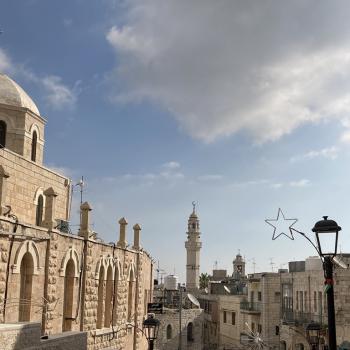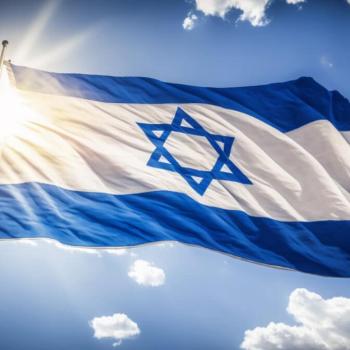There are so many things that compete for our attention. Gaza, Ukraine, and Ebola, deservedly so. Celebrity cheating rumors, royal baby rumors, not as important as wars and rumors of wars. Perhaps as it need be, most of us are consumed with our own jobs, our own families, and our own churches.

For a short time in June, the rise of the Islamic State of Iraq and Syria grabbed the attention of American newspapers and news programs. There were horrifying accounts of executions and the creation of hundreds of thousands of refugees. We have a short attention span, however. More recently, the fighting between Israel and Hamas and, increasingly, coverage of the Ebola outbreak have displaced ISIS from the headlines.
Still, ISIS has continued its efforts to create a Sunni caliphate and, in the process, to religiously cleanse minorities from its territory. My co-blogger Philip Jenkins has written in the Christian Century about the extinction of ancient Christian communities, including some of the world’s most venerable monasteries. “In Mosul,” he concludes, “we may be seeing the end of an astounding example of Christian continuity that lasted nearly two millennia.”
Perhaps we do not care because we feel powerless. We can pray (and should be pleading with God to help our co-believers under siege). We could call our elected representatives and demand that the United States do something to help save Iraq’s religious minorities from ISIS. At least publicly, the administration has devoted far more effort to brokering a resolution to the war in Gaza than to ending the far greater devastation in Iraq.
Over the past few days, word has come that ISIS fighters are on the verge of exterminating a large number of Yazidis holed up on a mountain near Sinjar. The Washington Post labels this population a “sect, which melds parts of ancient Zoroastrianism with Christianity and Islam. They are considered by the al-Qaeda-inspired Islamic State to be devil worshippers and apostates.” For a gripping account of the present situation, read George Packer’s article in the New Yorker.
I cannot provide an intelligent and grounded explanation of Yazidism, because I had not heard of it until very recently. Yazidism (sometimes Yezedism) is little understood. Its origins are uncertain, some describing it as a syncretic blend of Zoroastrian (or other ancient Persian), Islamic, and Christian belief and practice. The scholarly consensus seems to date the group to the twelfth or thirteenth century, centered in present-day northern Iraq. Some scholars trace Yazidism to a Sufi order influenced by local beliefs and practices. Yazidis have long formed a close-knit society bent on preserving itself from corrosive outside influences. Nelida Fuccaro, author of The Other Kurds: Yazidis in Colonial Iraq, notes that “apostasy, conversion and marriage with members of our religious groups are strictly forbidden.” I wish I knew more about this relatively small group, a monotheistic faith that believes in a pantheon of that one God’s incarnations. A recent book refers to Yazidism as The Religion of the Peacock Angel, because the chief incarnation (Melek Taus) is exactly that. Some Muslims and Christians have identified this angel as Satan, which is why the Yazidis have been accused of being devil worshipers.
Christians in the United States (myself included) have paid relatively little attention to the plight of their co-religionists in Syria and Iraq. It seems unlikely that they will pay significantly more attention to the plight of Yazidis in Iraq. As Packer writes:
There’s barely any public awareness of the unfolding disaster in northwestern Iraq, let alone a campaign of international support for the Yazidis—or for the Christians who have been driven out of Mosul or the Sunni Arabs who don’t want to live under the tyranny of ISIS. The front-page news continues to be the war in Gaza, a particular Western obsession whether one’s views are pro-Israel, pro-Palestinian, pro-peace, or pro-plague-on-both-houses. Nothing that either side has done in that terrible conflict comes close to the routine brutality of ISIS.
Still, American inaction in the face of an impending slaughter of Yazidis is not pleasant to contemplate. At the very least, one would expect our military could airlift supplies to the besieged Yazidis and find some way of arming the Kurdish fighters who have attempted to protect them. It is very tempting after the events of the last decade to simply presume that the United States can do nothing to help the peoples of the Middle East (or perhaps anyone else). However, our military has often been a powerful humanitarian force (one might recall the Berlin Airlift or, more recently, the relief after the Haitian earthquake).
It is wonderful that we have modern-day heroes such as Kent Brantly and Nancy Writebol, who risked their lives to minister to Ebola sufferers in Liberia. We might all donate funds to Samaritan’s Purse, which has expended a tremendous amount of money in an attempt to save the lives of both its own missionaries and the many African afflicted by the disease. Ultimately, however, international tragedies are a constant reminder of how limited our capacity is to express Christian love beyond our immediate families and communities. If we actually spent much of our time contemplating what ISIS is doing to Iraqis and Syrians (or devoted our thoughts to the many other tragedies unfolding around the world today), we might well cease to function. At the very least, though, it is a time to pray and a time to mourn.












